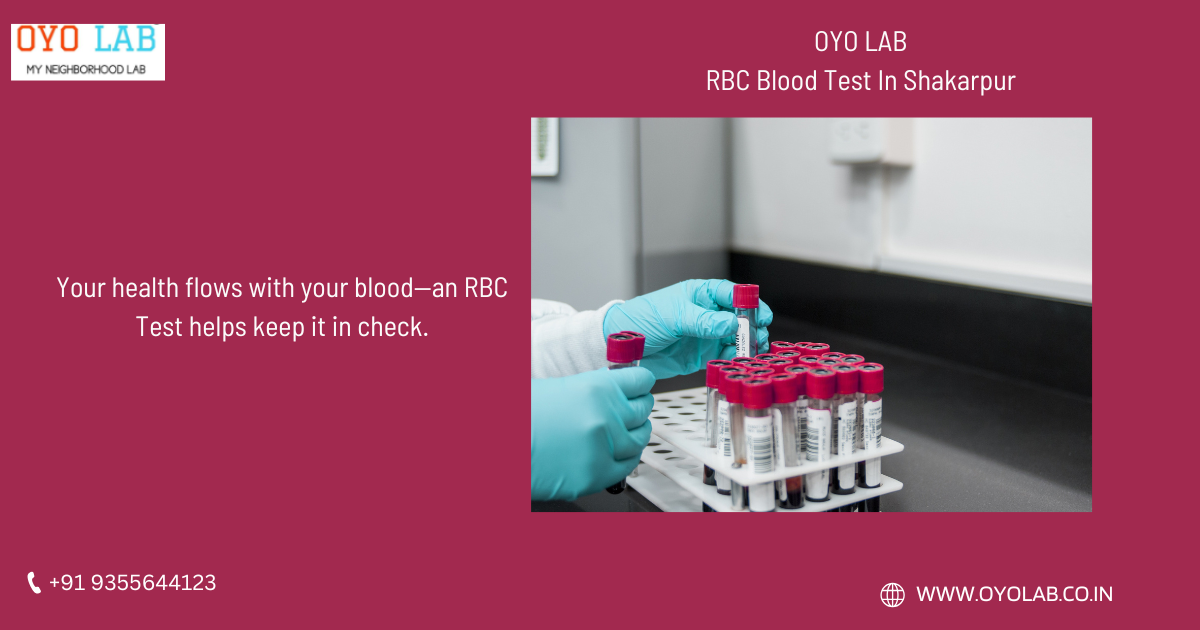
RBC Blood Test In Shakarpur
By Shilpa | March 27, 2025
What Is RBC Blood Test ?
The RBC (Red Blood Cell) Blood Test measures the number of red blood cells in your blood. Red blood cells are responsible for carrying oxygen from your lungs to the rest of your body and removing carbon dioxide.
Why Is the RBC Test Done?
Doctors order an RBC test to:
-
Check for anemia (low red blood cell count)
-
Diagnose polycythemia (high red blood cell count)
-
Monitor conditions like kidney disease, heart disease, or bone marrow disorders
-
Evaluate overall health and oxygen levels
Normal RBC Count Range
-
Men: 4.7 to 6.1 million cells per microliter of blood
-
Women: 4.2 to 5.4 million cells per microliter
-
Children: 4.1 to 5.5 million cells per microliter
Causes of Abnormal RBC Levels
Low RBC Count (Anemia) may be due to:
-
Iron deficiency
-
Blood loss
-
Bone marrow disorders
-
Kidney disease
-
Vitamin B12 or folic acid deficiency
High RBC Count (Polycythemia) may be caused by:
-
Dehydration
-
Lung disease
-
Heart disease
-
Living at high altitudes
-
Bone marrow disorders
Importance Of RBC Blood Test
The RBC (Red Blood Cell) Blood Test is an essential diagnostic tool that helps assess your overall health and detect various medical conditions. It measures the number of red blood cells in your blood, which are responsible for carrying oxygen throughout your body.
Why Is the RBC Test Important?
Detects Anemia:
A low RBC count can indicate anemia, which may cause fatigue, weakness, and shortness of breath. Identifying anemia early allows for timely treatment.
Identifies Oxygen Transport Issues:
Red blood cells play a crucial role in delivering oxygen to tissues. Abnormal RBC levels can signal problems with oxygen supply, affecting overall energy levels and organ function.
Helps Diagnose Blood Disorders:
An abnormal RBC count may indicate conditions like polycythemia vera (excess red blood cells), sickle cell disease, or bone marrow disorders.
Monitors Chronic Diseases:
Doctors use RBC tests to monitor diseases such as kidney disease, heart disease, and lung disorders, where RBC levels can fluctuate due to disease progression.
Evaluates Overall Health:
The RBC test is often included in a Complete Blood Count (CBC), which provides a broader view of your health and helps doctors detect potential health concerns early.
Benefits Of RBC Blood Test
The RBC (Red Blood Cell) Blood Test is an important diagnostic tool that provides valuable information about your health. It measures the number of red blood cells in your blood, helping doctors detect and monitor various medical conditions.
Key Benefits of the RBC Blood Test
Early Detection of Anemia
A low RBC count can indicate anemia, which can cause fatigue, weakness, and dizziness. Early detection allows for timely treatment with iron, vitamin B12, or other necessary supplements.
Identifies Oxygen Transport Issues
Red blood cells carry oxygen throughout the body. If RBC levels are too high or too low, it can affect oxygen supply to tissues and organs, impacting overall health and energy levels.
Helps Diagnose Blood Disorders
The test can help identify blood-related conditions such as:
-
Polycythemia (excess RBCs, which can increase the risk of blood clots)
-
Sickle Cell Disease (abnormal RBC shape affecting oxygen transport)
-
Bone Marrow Disorders (conditions affecting RBC production)
Monitors Chronic Health Conditions
Doctors use RBC tests to track conditions like:
-
Kidney disease (which affects RBC production)
-
Heart disease (which may cause RBC fluctuations)
-
Lung disorders (where RBC levels can indicate oxygen levels in the blood)
Guides Medical Treatment
For patients undergoing treatment for conditions like cancer, kidney disease, or chronic illnesses, RBC tests help doctors adjust medications and treatments based on blood health.